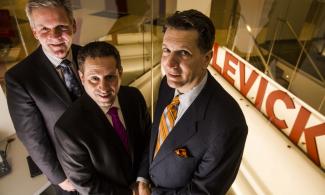

In the past week or so, I have read quite a number of articles and comments about the 'purported' award of a public relations (PR) contract to a foreign-based PR consultancy, LEVICK, which, as a local news site - www.thecable.ng - put it, was hired by the News Agency of Nigeria to manage the international information on President Goodluck Jonathan on the Boko Haram insurgency, especially after the battering he got in the foreign media over his handling of the abduction of Chibok schoolgirls.
Well, blame it on the Nigerian social media that, at best, sensationalize every news or report relating to the government or, at worst, fill their pages with unsubstantiated claims, half-truths and outright false and misleading account of events, I take every information I get with a pinch of salt until I can satisfactorily prove the veracity. Hence, my reference to the Levick story as a mere 'claim'. It might as well be true!
But this article really isn't about the truth or falsehood of government's hiring of a PR agency (I couldn't care less if it is foreign or local). No! It's about the imperatives of nation branding for a country like ours. Like it or not, Nigeria needs a LEVICK, a 'Quadrant', a 'Sesema' or an 'Uburu' to help sort out its image problems!
According to one of the world's leading voices on the subject of National Identity, Simon Anholt, a nation's 'brand' generally refers to the common images, perceptions and associations people have with that nation. Therefore, 'nation branding' is an important tool used by countries to create, change or promote a distinct self-image and international reputation.
And the value of a country's reputation is not hard to understand. It can attract people and money through foreign direct investment, trade, tourism and immigration, as well as provide 'soft power' in the shape of political, diplomatic and cultural leverage.
To this end, Argentina handed a near seven-figure account to Bell Pottinger - a US-based agency - in 2009 to improve its reputation in Europe and the US. Russia used another US firm, Ketchum, to challenge its reputation of secrecy, and Dubai employed a number of foreign agencies to help repair its dwindling financial reputation.
In the run-up to the Beijing 2008 Summer Olympics, China began an ultimately fruitless search for PR counsel that would help revive a faltering international image. And, as the 2010 World Cup drew closer, South Africa appointed international firms, MS&L and Dow Jones Insight, to its global communications effort.
All of these countries, says a PR Week report, are following a template that was only formalised in 1990. It was the global PR firm, Hill & Knowlton, to which Kuwait turned when it was invaded by Iraq. The agency was asked to create international sympathy and Western military support for what was essentially an oil-rich undemocratic regime in the Middle East. It worked!
The reality is that more and more national bodies, today, are turning to high-level communications counsel in order to revive flagging or damaged images (and rightly so). As Simon Anholt put it, 'if there is a master marketing discipline for countries then it is certainly PR.'
Nigeria's global reputation can surely benefit from deliberate, well-orchestrated PR efforts too. Beyond the shoddy handling of the Chibok abduction, which has, deservedly, projected the country in bad light, most Nigerians who live abroad, or who have had the privilege of visiting other countries understand how unfairly bartered our international image is.
Even from the preferential treatment meted to Nigerian citizens at regional and international gateways, you can tell how poorly Nigerians are perceived as a people.
Of course, like most countries of the world, Nigeria has her peculiar problemsand very serious ones too. But listening to non-nationals talk about Nigeria, it would seem as though ALL Nigerians were crooks and terrorists. While some of the negative commentaries are true, most Nigerians are actually hardworking, peace loving and friendly people. There's an obvious perception problem that needs to change!
Having said this, it is important to also note that the power of communications to change perceptions is ultimately limited by a country's behaviour. PR cannot create an image that doesn't correspond with reality. It can make the best of a country's capabilities and attractions but cannot invent what's not there.
A country is judged by what it does. By this I mean its economic performance, commitment to education, health and environmental matters, infrastructure development, technological advancement and production capabilities, security, justice systems, human rights issues such as child labour, gender inequalityand so on.
Changing global perceptions is, no doubt, a difficult challenge; stereotypes and beliefs about countries are often emotional and deeply held. But as Nigeria makes 'deliberate' efforts to improve her ratings on the above indices through good governance, PR can be used more effectively to change the mindsets of people, home and abroad.
Movies, music, art and culture are great tools for national reorientation and influencing global perceptions. We must add these to the PR mix and, through these mediums, focus attention on all the positive developments coming out of the country.
A professional PR agency can add significant value by distilling the complexity of the country into a compelling story, and building bridges with the international community. LEVICK, or any agency tasked with managing the nation's reputation, must be allowed to do its job, and the government must also understand that while PR is extremely important, it can only complement the change process. Only statecraft can drive it!
Tony Usidamen is Managing Partner at Uburu - a business communications consultancy. Email: [email protected]